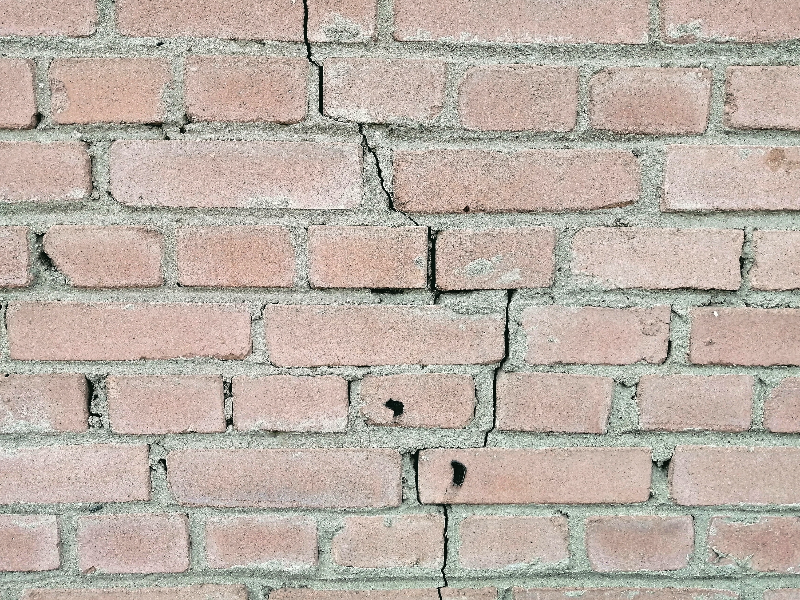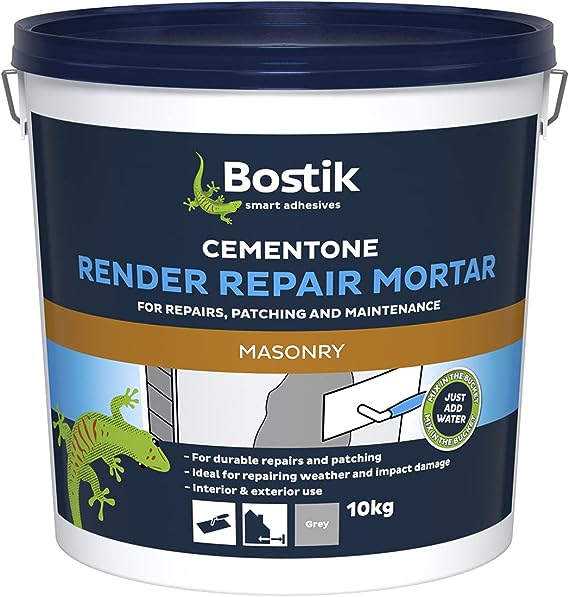
Yes. Home insurance buildings cover will include damage to external walls and render on your property if it has been caused by a claimable event. Claimable events include fire damage, flood damage, subsidence, landslip and heave.
You will need to check your individual policy document to ensure you have the right level of cover in place.
In this insight, we'll explore what home insurance covers in relation to render and walls and provide useful advice on how to make sure you're properly protected.
Home insurance is a vital safeguard for homeowners, providing financial protection against damage, theft, and other risks. But it can be hard to know exactly what is and isn't covered by home insurance policies. One common area of confusion is whether or not home insurance covers cracked render or walls.
The answer is that it depends on the specific policy, but generally speaking, home insurance will cover repairs to cracked render or walls in certain circumstances.
A cracked Wall or render can be a sign that you have a serious structural problem, although most of the time it's nothing more than a minor crack that appears by a window.
Before you appoint a surveyor, some of the common reasons why cracks occur are as follows:
Any cracks that are more than 5mm should be investigated thoroughly. However, if do you have cracks that are smaller, approach cautiously but consider using a simple Render Repair product as an initial layer of protection from the crack expanding.

We earn a commission if you make a purchase, at no additional cost to you.
Home insurance is a type of insurance that covers damage to the structure of your home, as well as possessions inside it. There are various types of home insurance policies, specifically, it should be your Buildings insurance that provides financial protection against a damage such as cracked walls.
The types of risks that may be covered by Buildings home insurance include damage to the structure of your property (for example, if it was damaged by a storm), damage to your possessions (for example, if they were damaged by a flood).
Should your Walls and render become damaged, it would normally be your buildings insurance that would be required to make a claim.
Home insurance will cover cracked render or walls if the damage is a result of one of the specific risks that are covered by a typical home insurance policy. Generally speaking, cracked render or walls are not covered if they are the result of normal wear and tear, or if the damage was caused by something you did on purpose.
Specifically, home insurance covers cracked render or walls if the damage is a result of: Storms Theft Fire Flood Damage caused by animals (for example, rats)
If the damage to your render or walls is the result of one of the risk scenarios that are provided within your policy, then you should be eligible for make a claim. However, if the damage was caused by a risk that isn't covered by your home insurance policy, then you'll need to pay for the repairs yourself.
For example, if your render or walls are damaged due to water ingress, home insurance won't cover the repairs, as water ingress is almost always excluded from home insurance policies. Home insurance might cover cracked render or walls, even if the damage was caused by normal wear and tear, or if it was your fault.
However, it will depend on the specific policy and your home insurance provider's underwriters. In general, the more expensive the policy and the higher your claim history, the more likely it is that home insurance will cover cracked render or walls if they were damaged by normal wear and tear or if it was your fault.
Home insurance won't cover cracked render or walls if the damage was caused by something that is specifically excluded from the policy.
Examples of things that may be excluded from home insurance policies include:
Cracked render won't be covered if it is a result of wear and tear. Use the best render cleaner available to you to keep on top of maintaining healthy walls.
If your render or walls have cracked due to one of the risk scenarios above, and your home insurance policy covers these repairs, you'll need to submit a claim. The exact process and documentation required varies between home insurance providers, so it's best to check with your provider to find out what you need to do.
If your home insurance policy covers cracked render or walls and you've already submitted a claim for another type of risk, such as water damage, you should be careful not to double-dip. For example, if you've claimed for water damage and your home insurance covers the repairs, don't also claim for the same repairs to the render or walls.
Doing so may result in your home insurance provider denying both claims or even cancelling your policy.
When you're deciding which home insurance policy to buy, it's important to make sure you get the right coverage. For example, you'll need to make sure you have the right amount of cover for the structure of your home, as well as the right amount of cover for your belongings.
There are a few things you can do to make sure you get the right coverage. First, you can seek advice from an insurance adviser or Mortgage adviser.
These advisers can offer home insurance solutions from a wide range of providers. Second, you can read your policy carefully to make sure you understand what is and isn't covered. Finally, be sure to ask your adviser any questions you have.
If you are living in a home less than 10 years old, you may opt to look at making a claim through the New Homes Building Council (NHBC) scheme which provides warranty for your new build property.
Especially if you suspect there is a serious issue with the structure of your home it would be advisable to speak to NHBC so they can assess the property condition via a surveyor.
When you're buying a home insurance policy, it's important to make sure you get the right amount of cover. If you're buying a new home insurance policy, you'll need to make sure your home cover is adequate to replace your home in the event of a major disaster (such as a flood or earthquake).
It's also important to make sure you have enough contents cover to protect your belongings in the event of a fire or other type of damage. If you have expensive items, you may want to consider getting a special policy to cover them, especially if you have a high net worth.
If you are looking for Insurance advice, get started with the Sunny Avenue Fact Find.
We use your answers to find the most suitable adviser for your needs. The adviser then contacts you for a no obligation conversation. You decide how to proceed.

Stuart is an expert in Property, Money, Banking & Finance, having worked in retail and investment banking for 10+ years before founding Sunny Avenue. Stuart has spent his career studying finance. He holds qualifications in financial studies, mortgage advice & practice, banking operations, dealing & financial markets, derivatives, securities & investments.
 No minimum
No minimum  Free Consultations
Free Consultations
 No minimum
No minimum  No obligation consultation
No obligation consultation
 No minimum
No minimum  Free Consultations
Free Consultations
 No minimum
No minimum  No obligation consultation
No obligation consultation
 No minimum
No minimum  No obligation consultation
No obligation consultation
 No minimum
No minimum  Free Consultations
Free Consultations
 No minimum
No minimum  Coatbridge, Lanarkshire
Coatbridge, Lanarkshire Initial or Ongoing Consultation Fees
Initial or Ongoing Consultation Fees
 No minimum
No minimum  Initial or Ongoing Consultation Fees
Initial or Ongoing Consultation Fees
 £21,000 +
£21,000 +  Initial fee free consultation
Initial fee free consultation
 No minimum
No minimum  No obligation consultation
No obligation consultation
 No minimum
No minimum  Initial fee free consultation
Initial fee free consultation
 No minimum
No minimum  Initial fee free consultation
Initial fee free consultation
 No minimum
No minimum  No obligation consultation
No obligation consultation
 No minimum
No minimum  Initial fee free consultation
Initial fee free consultation
 £101,000+
£101,000+  Bishop's Stortford, Hertfordshire
Bishop's Stortford, Hertfordshire No obligation consultation
No obligation consultation
 No minimum
No minimum  Derry / Londonderry, County Derry / Londonderry
Derry / Londonderry, County Derry / Londonderry Free Consultations
Free Consultations
 No minimum
No minimum  Stockton-on-Tees, County Durham
Stockton-on-Tees, County Durham Free Consultations
Free Consultations
 No minimum
No minimum  Initial fee free consultation
Initial fee free consultation
 No minimum
No minimum  Cheltenham, Gloucestershire
Cheltenham, Gloucestershire No obligation consultation
No obligation consultation
 No minimum
No minimum  Initial fee free consultation
Initial fee free consultation
 No minimum
No minimum  Free Consultations
Free Consultations
 No minimum
No minimum  Initial fee free consultation
Initial fee free consultation
 £51,000+
£51,000+  Sheffield, South Yorkshire
Sheffield, South Yorkshire No obligation consultation
No obligation consultation
 No minimum
No minimum  Free Consultations
Free Consultations
 No minimum
No minimum  Stockton-on-Tees, County Durham
Stockton-on-Tees, County Durham Initial fee free consultation
Initial fee free consultation





Our website offers information about financial products such as investing, savings, equity release, mortgages, and insurance. None of the information on Sunny Avenue constitutes personal advice. Sunny Avenue does not offer any of these services directly and we only act as a directory service to connect you to the experts. If you require further information to proceed you will need to request advice, for example from the financial advisers listed. If you decide to invest, read the important investment notes provided first, decide how to proceed on your own basis, and remember that investments can go up and down in value, so you could get back less than you put in.
Think carefully before securing debts against your home. A mortgage is a loan secured on your home, which you could lose if you do not keep up your mortgage payments. Check that any mortgage will meet your needs if you want to move or sell your home or you want your family to inherit it. If you are in any doubt, seek independent advice.